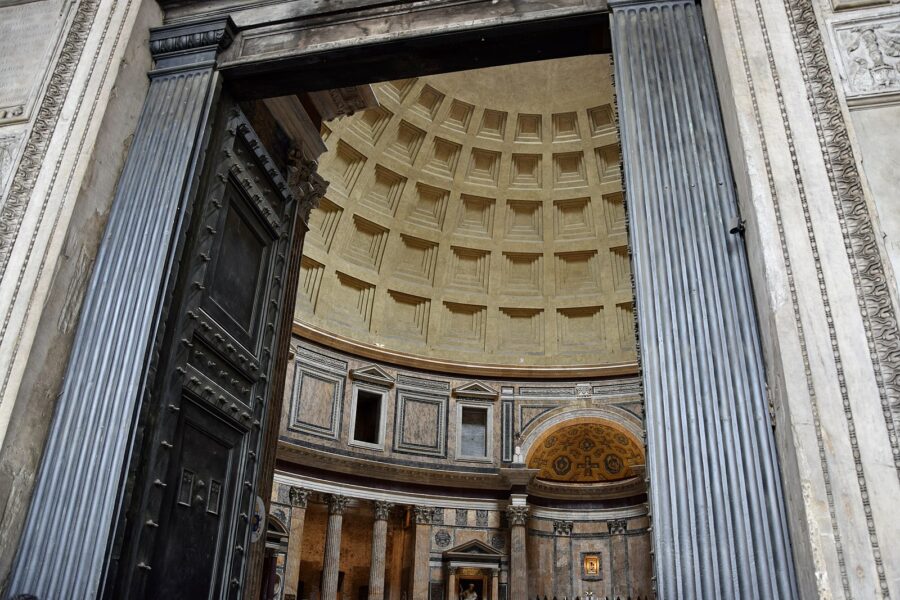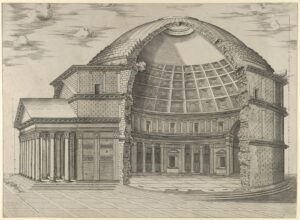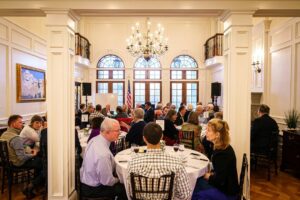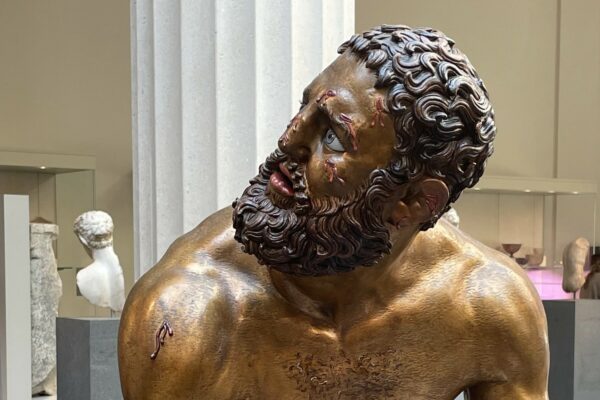
Ok, *this* might be a proprietary design.
Episode 40: In which the Parthenon’s architect and Thomas Jefferson continue discussing proprietary designs, in this case dominating domes.
This episode of Real Housewives of Hades (a Mt. Olympus spin-off) brought to you by the latest Classical Studies news – and by CLAS-C 102 Ancient Roman Culture.
[SETTING: Underworld Club for Architects]
PHIDIAS, DESIGNER OF THE PARTHENON: Jefferson, Apollodorus of Damascus is looking for you. You might want to lay low for awhile. He’s pretty mad. And yelling about Neo-Classical architecture.
THOMAS JEFFERSON, DESIGNER OF THE DECLARATION OF INDEPENDENCE AND OCCASIONALLY BUILDINGS: Who is Apollodorus of Damascus and why is he so upset?
PHIDIAS: Apollodorus of Damascus designed the Pantheon in Rome. And he’s angry because the mortals are copying your architectural designs as a tribute to you. He claims you stole his ideas and now you’re stealing his press.

Mine!
JEFFERSON: I’m pretty sure that was Hadrian who designed the Pantheon. After all, he was a highly sophisticated leader who was also a skilled amateur architect. Much like yours truly. And if you haven’t been following the mortal news, they’ve been taking down my statues lately, not putting them up.
PHIDIAS: Not everyone. According to this scroll, a small college in Michigan recently established a multi-million-dollar Christian studies center in Connecticut, because the property included a one-to-one replica of your mansion Monticello in Virginia.
JEFFERSON: (blinks) I recognize most of those words, but the combination doesn’t make any sense. Why would someone in Connecticut build a plantation house? Do they have large agricultural estates there now? Or in Michigan? Last I heard the Northern colonies were going in the opposite direction.
PHIDIAS: Well, from what I can tell, the builders of Monticello the Sequel were doing their best to make their own estate, although I don’t think they were farmers. It says here they owned a restaurant chain, whatever that is.

The original model for the standard Friendly’s Restaurant proved fiscally unsustainable.
JEFFERSON: Ugh, that sounds like Hamilton’s thing. The man is non-stop. Did you hear he’s trying to start a Bank of the Underworld? Despite the fact that shades don’t use money and Hades already has all the planet’s mineral wealth. Anyway, if these mortals don’t have a vast agricultural estate to tend and dependent laborers to rule, why would they build a copy of Monticello?
PHIDIAS: Well, they claim it’s because you were supposedly such a proponent of freedom.
JEFFERSON: Supposedly? Why so skeptical? You must have heard my catchphrases. “Life, Liberty, and the Pursuit of Happiness?” “All men are created equal?”
PHIDIAS: There just seems to be a logical disconnect between your celebrating freedom and equality, and then using slave labor to build a mansion where you would eventually keep your own children in bondage.
JEFFERSON: Well, obviously when I said “all men” I was only talking about rich, White, property-owning males. Who else would I have been talking about?
PHIDIAS: You know, women, the poor, your enslaved children, literally everyone else…
JEFFERSON: Oh come on, as an ancient elite you should know that the only people worth talking about positively were fellow elites. I thought I was very clear about my worldview. In fact, look at Monticello! I designed my estate openly based on the Pantheon. That was the entire point. How better to indicate that I am a landed gentleman in the tradition of Cato and Cicero than by building a house in their architectural style?

As with most things, if you zoom in tight and remove any context, you can make it look less ridiculous.
PHIDIAS: Come to think of it, why didn’t you chose my Parthenon as a model? It would have been easier to copy. Look what they did in Tennessee!
JEFFERSON: Um, this is awkward…look, Phidias, I’ve never actually been a fan of the Greeks. Or true democracy. The peasants are so…idiotic. And revolting. In both the literal and metaphorical sense. That’s why the other Founding Fathers and I were very clear that we were following a Roman model and establishing a Republic. Rule of the established few in the interest of the incompetent, dangerous many, and all that. No one reads Cicero and thinks “this is a man who loves peasants.” I don’t know how I could have been more clear about this. Do these mortals not read my work?
PHIDIAS: Actually, that Michigan College is really into reading the original documents. But maybe they’re not very good at understanding them? Because when you think about it, it’s sort of weird that an institution specifically founded to offer education to all, regardless of sex or race, is now opening a Christian studies center to honor a strident non-Christian who enslaved people specifically because of sex and race. And they’re doing all this in the name of equality, while set in an extravagant architectural manifestation of his exclusive, elitist worldview. This is making less sense even as I describe it.

One of these things is not like the…oh, wait.
JEFFERSON: Unless they understand me just perfectly and support my original documented agenda.
PHIDIAS: Well, if you employ the logical thinking that we Greeks are so famous for, that’s certainly a reasonable conclusion. Given that it’s perfectly possible to support ideas like America’s religious freedom without, you know, building a shrine to a slaveholder in the Connecticut woods.
JEFFERSON: I like to think Hadrian would approve.
PHIDIAS: Yeah, about Hadrian. Apollodorus of Damascus was a military engineer who famously built a massive bridge relying on an ingenious series of arches across the Danube River. It makes more sense that he would have designed the Pantheon and its famous arched spaces, rather than some emperor whose main personal architectural achievement, according to the original documents, is killing Apollodorus.

As for nearly all Roman architecture, the symbolic message is “**** you.”
JEFFERSON: The esteemed Pantheon is the product of an eastern immigrant who worked for a living? Please. I can’t think of anyone I’d be less likely to emulate. Look at what I wrote about Hamilton, and he was from a Scottish family that had settled barely east of Boston.
Share on Twitter, or Instagram, or really wherever you want.
To learn more about how the Romans invented (an admittedly brutal) Republican government, and never let the world forget it, enroll in CLAS-C 102 Ancient Roman Culture, coming up Spring 2023, and earn GEC credits while you’re at it! Or if (admittedly chaotic) democracy’s more your speed, check out CLAS-C 351 Change and Innovation in Ancient Greece, also coming up Spring 2023 with no pre-reqs! Can’t get enough of Ancient Greece and Rome? Earn a Classics Minor in just 15 credits!


